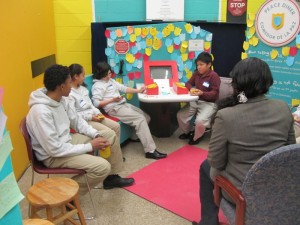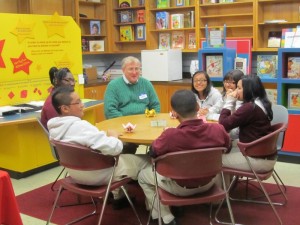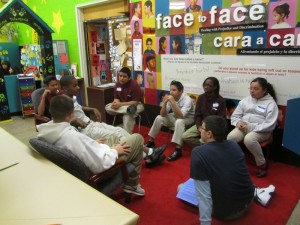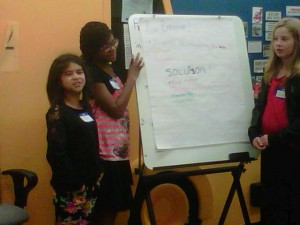UPstander Leadership Program:
A curriculum for Middle School Students & Educators presented in partnership with The College of New Jersey.
Part one:
 Students visit and experience the Kidsbridge Tolerance Museum
Students visit and experience the Kidsbridge Tolerance Museum
Your middle schoolers will break out into small groups and participate in interactive exhibits and discussions about:
- Prejudice and Discrimination
- Name-Calling
- Stereotypes
- Bullying and Cyber bullying
- Self-Esteem and Empowerment
- Heroes vs. Celebrities and Local Heroes
- Sensitivity to Persons with Disabilities
- Sensitivity to LGTB persons
- Religious and Cultural Tolerance
- Bystander vs. UPstander behavior
Part two:
 Training
Training
Students will be trained as docents to lead their peers (back at school) in discussions on some of the subjects noted above. Conflict resolution scenarios will be presented and options for resolution offered. Includes training in:
- How to improve middle school culture
- How to be more sensitive to LGBT persons, changing culture
- How to empower yourself as a victim
- How to be an UPstander, not a bystander
- How to be empowered as a middle school student
- The importance of community service and activism
Part three:
 Action plans to take back to school
Action plans to take back to school
At the museum, students will identify local and global issues that they feel passionate about. Using information they learned at the museum exhibits, students will draft the beginnings of action plans that can be spearheaded by a small group but embraced and addressed as a larger group – or the entire school. Teachers, guidance counselors and other school staff – as well as parents and community leaders – will be asked to provide guidance and support to execute these plans. Topic examples include:
 Bullying, cyber bullying and victim empowerment
Bullying, cyber bullying and victim empowerment- UPstander or ally behavior
- Name calling, teasing & exclusion
- Anti-Gay bashing and stereotyping
- Diversity appreciation (cliques, racial mixing, religion, cultural differences)
- Native Americans as U.S. sports team mascots
- Global issues (Darfur, genocide)
- Local issues (hunger, homelessness, fund-raising, supporting a worthy cause, mentoring of younger students)
- Community service and activism (how to be a local hero)
Two Projects to consider:
1) Creation and signing of an UPstander pledge
Have as many students and school staff (and parents? and community members?) sign a pledge stating that whenever students witness intolerant behavior that they promise to identify it and address it at the time. Draft and sign a pledge. Create and distribute a logo, piece of jewelry, badge, sticker, etc. that represents the pledge and epitomizes the wearer’s commitment to enforcing UPstander behavior.
2) Puppets and skits to illustrate tolerance and “unacceptable” behavior
Middle school students can make stick puppets and draft skits on various subjects. They can put on plays for younger students. OR they can mentor younger students, allowing the younger children to create the stick puppets and draft skits depicting conflict and resolution, under the middle schoolers’ guidance (reinforcing UPstander behavior).
Student reflections of the museum
“It affected me a lot because all my life I have had problems with people making fun of me for many reasons. And now I know that there are other people out there that are dealing with what I deal with. I don’t feel so alone. Also I know we can all stick together, and be a family and stop stereotyping and racial comments.” — 7th grade, male
“Each exhibit shows why not to treat people bad or tease.… So I stopped teasing people; that was a good lesson. When people tease me, I feel the same way. The shredder machine shredded all my bad feelings and I felt much better. I feel good as new.” — 8th grade, male
“The Darfur rooms showed me that there’s more to worry about in the world then just yourself.” — 8th grade, female
“I never knew how mean people can be. I know that sounds bad, but I also learned that one small voice can make a difference in someone’s life. From offering a bus seat to telling someone to stop teasing, we can make the world a better place.” — 7th grade, female
Educator observations on student behavior after a visit to the museum
“I want to thank you and your team for a wonderful visit. Our students had a WONDERFUL TIME! They learned SO much! This experience is one they will be able use during our End of Year Production. They came away with such great information and awareness that their dance, vocal and theater performance will be that much stronger because of what they learned visiting Kidsbridge. Their connection to the content that we are presenting has really come to life for them and I want to thank you for the experience.” –Founder of BAMSOPA/Body and Music School of Performing Arts
“Away from school in a different setting, a teacher can pick-up a lot of information from their students and bond with them on a whole different level. Connections are the keys, and bonding is everything. It affects learning and performance in a very positive way.” –6th grade teacher, Stewartsville Middle School
“This was an amazing experience for both me and my students. A lot of good discussions were had. The stations were spot-on with the students’ age and grade level. I learned a lot about my students today. This will help me relate to them more and be more sensitive to their needs.” –7th grade teacher, Village Charter School
“It was fascinating to watch these students transform themselves from shy presenters into confident experts in their assigned area. This has been an excellent leadership training program for my students.” — Middle School Guidance Counselor
“The sensitivity to disabilities room really affected me. Putting on a blindfold and trying to see or putting on an oven mitt and trying to pick things up put me in the shoes of the disabled. I never realized how frustrating blindness and muscle dysfunction was. I think this exhibit will really help kids understand all kinds of people.” — Middle School Teacher
“Kidsbridge provides a well structured, age appropriate program to address tough topics that need to be talked about. It is a great springboard for deeper discussions back at school.” –Middle School Guidance Counselor
[pl_button type=”kidsbridge” link=”https://kidsbridgecenter.orgmuseum/exhibits-midle-hig/”]See our middle, high school exhibits[/pl_button]
